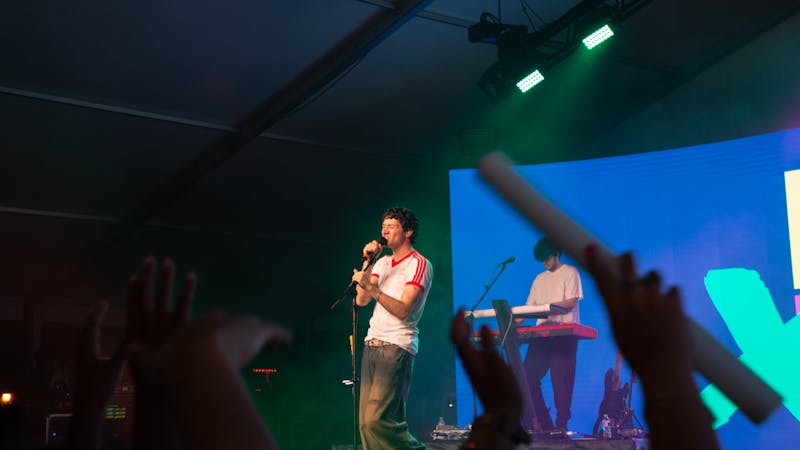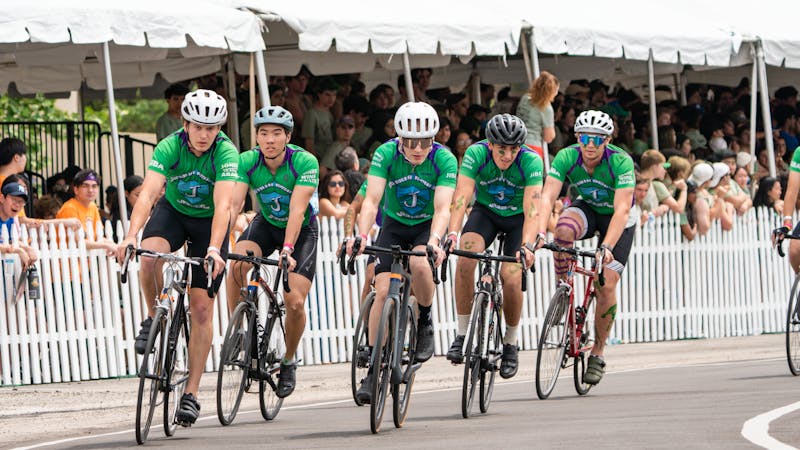Thresher exclusive: election interview with NBC's Hallie Jackson

As voters at Rice and across the country prepare to choose a new president, the Thresher spoke with NBC News journalist Hallie Jackson regarding the closing days of the presidential campaign and her experiences covering the race. Jackson, who hosts the 1 p.m. hour on MSNBC, extensively covered the Republican Party primary campaigns and will be contributing to NBC's Election Night coverage today beginning at 6 p.m.
Listen below to Thresher News Editor Drew Keller and Assistant News Editor Emily Abdow talk to Jackson on the state of the race nationally and in Texas, the role of millennials in the election, third-party voting, claims of bias in press coverage and more. The conversation took place by telephone the Friday before Election Day.
NBC's election coverage will be available on YouTube and their website in addition to broadcast television. Several on-campus organizations including the Center for Civic Leadership and Political Science department are jointly hosting a watch party tonight in the Rice Memorial Center Grand Hall, also beginning at 6 p.m.
Transcript:
Drew Keller, The Thresher: The question on everyone's mind is — what's your prediction for Tuesday? What's the state of the race look like, according to you?
Hallie Jackson, NBC: And you ask that, knowing that I cannot make predictions — come on! But what we can do is talk about the state of the race, which is particularly fascinating with four days to go. What we're seeing right now, nationally and in the battleground states, are a lot of polls seeming to tighten. Hillary Clinton still has the edge in most of the places that really matter the most, if you look at the key states to watch — as you know, Florida, North Carolina, Ohio — the thing is, even if Donald Trump wins all of the typically red Republican states, even if he wins those really important battlegrounds, he's still got to dent what we like to call 'Clinton's blue wall.; He has to flip a state that went Democratic in the past. Where's that state going to be? If I had to guess: Michigan, Pennsylvania, Wisconsin — those are the three states I hear about the most from the Trump campaign, with a top source telling me that they're feeling probably better about a place like Michigan versus a place like Wisconsin, particularly after some of that polling came out earlier this week showing Trump trailing Clinton by six points.
On Election Night, I'm gonna be posted up at 30 Rock with our team of incredible anchors. I'm looking at exit polling, I'm looking at the battleground maps as well with Chuck Todd. On Tuesday night, when we're really focused on that, I'm looking at the returns from Pennsylvania, from Wisconsin, from Michigan — a couple of those are East Coast states in eastern time zones, so that's going to be super fascinating. And that's going to give us the best indication of Donald Trump's chances on Election Night. It's going to be a huge nine hours of coverage I think, and it all comes down to — listen, I hate to sound like a cliche, but it does all come down to turnout, and that's what we're going to be watching — we're not sifting through that exit poll data.
Emily Abdow, The Thresher: Our next question for you is: as you've covered the campaign so far, mainly Ted Cruz's campaign and then others, what role have you seen millennials playing in the election?
HJ: I'm so glad you asked that. I just had a conversation with one of my sources outside the Trump campaign, a Republican operative, who talked about how important millennials are going to be in this election. And particularly how undercover they've been on the millennial side, millennials who support Republicans and what their role is on college campus, et cetera. First of all, the word 'millennials' — it's a weird word, right? It's a strange word. Like, what do you call them? 'Young folk'? When I see young people on the campaign trail, they are the backbone of a lot of the Get Out The Vote operation. They're the ones who are out on the ground, doing the door knocking, doing the phone calls on both sides. Typically you see millennials break more for Democrats but I think what Republicans are trying to do is harness the power of the younger generation because they know in 15 years that's the generation that's going to be driving a lot fo the decision making process. I've personally as a "millennial" myself, granted on the older end of the spectrum but still, I think that's one of the more important stories of this election. It's partly why I for example, with my producer Frank Thorpe, we love to Snapchat because we know that that is, first of all, super fun and, second of all, is where a lot of young people get their news from. I've had more folks on Capitol Hill come up to me: 'Oh my God, I love your Snapchat' than come up to me and say 'I love you on nightly news.' It's very generational. So I think that this election, social media, Snapchat, Twitter especially, has been a way to get out the message and particularly to get out your stories, your coverage in a way we haven't seen before.
DK: Along those lines, what would you say as a reporter is the most challenging part of covering this election?
HJ: You know, I think it is the grueling length of this election. We know that campaigns run long, but this one especially. I started on the road last July, July of 2015. I've essentially been on the road for a year and a half. It's hard to be away from your friends, your family — you're traveling every single day. We're on different flights, we're in different hotel rooms, we're in different cities, and that can be a little bit challenging, just the actual logistics of it all. You're not only going 100 percent on your coverage, on your reporting, and making sure you're up to date on what's happening inside your beat, and performing, being able to put on stories for the day show and nightly news, and I now for the election I did an hourlong show on MSNBC every day at 1 o'clock. So you're anchoring the show from the field, you're also continuing to file for MSNBC. So doing all that plus the travel definitely can get logistically tricky but that's why you have great teams in place to be able to help you manage all that and I've gotten really good at sleeping on planes which is a nice benefit.
EA: Another challenge when we were brainstorming questions was we were thinking about how particularly from the Trump campaign there's a lot of accusations all the time about journalists and press coverage and unfair press coverage, so another question we had is: what do you do to kind of combat these claims or to have fair press coverage and what is your response to claims like that from either side of the campaign.
HJ: I think that what you see from Donald Trump on the campaign trail is to some degree playing to his audience: pushing a message of an unfair media, something we've seen Republicans doing for a long time. That is not a new argument and it plays well I think with his base, people who support him. I would say that as a reporter every campaign you work with in different ways and they understand still the importance of the media and coverage. So think that there sometimes is a public sort of argument and there is what happens behind the scenes privately and I think those can be a little different, you can contrast the two.
DK: So I guess bringing it back to Rice a little bit more, being located in Houston there's been a pretty big effort by Democrats to turn out the vote what with recent polls showing that Texas was within maybe three or four percent. That may have widened a bit in the last week. But I guess we wanted to ask specifically: What do you see as being the situation in Texas and what should we expect coming up to Election Day?
HJ: I think that what the Democrats are trying to play in Texas is mostly a head fake frankly. I think the money you've seen spent there is sort of tantalizing but not significant and it's partly to drive the narrative. Every Republican operative that I've talked to, every Democrat, nobody seriously thinks Texas is going to go blue. And I just think it's an interesting little nugget to talk about but I just haven't seen anything in the polls to show any real sense that it is a state that could flip. Georgia on the other hand, if you were, you know, some school in Atlanta, you know what I mean, maybe we'd be having a different conversation. But I think Texas, it's pretty safe bet it going to go red. What I think is interesting is when you talk about being in Houston and Ted Cruz, where he lives and all that, is what's going to happen in 2020 and how does even the down ballot stuff in Texas shake out in 2018. So that to me is the more interesting Texas story.
EA: Another question we have for you is - we actually recently ran an editorial and our board wrote urging people not to vote third party and it got a bit controversial so our question for you is, what do you think the effect of third party voting will end up being in this election?
HJ: That's interesting, say that again. You ran an editorial saying what?
DK: We urged people not to vote third party. I think especially among, again, our generation, there's a significant number of people who Clinton was not at all their first choice and, as you said, most people are quite liberal. So I think there's a lot of people who were considering voting for Jill Stein or Gary Johnson. So we wrote an editorial urging people not to vote third party.
EA: Received a lot of letters to the editor in response.
HJ: Wow, that's really interesting. I mean listen, my role as a journalist — sorry, I'm eating my breakfast — my role as a journalist is not to tell people how to vote, obviously, you know what I mean, and I think everybody has a right to exercise their voice and if that means for a third party, if that means for a Democrat or a Republican or a write-in candidate, power to the people, you know what I mean. I think we talk about broadly from a big picture view the effect of third party candidates, to me, you're looking at the Johnson effect. I do think that his 'Aleppo moment,' if we're going to call it, that was damaging to him in a way that he struggled to recover from. And I think that Evan McMullin to me is one of the more interesting third party candidates, only in Utah, because of where he is in Utah. The polling there has shown that he is very strong and that a very typically red state — that's something else we'll be watching on Tuesday night when we're holed up in the building looking at all the results coming in, writing in our decision. But how does Evan McMullin do in Utah? Could he actually win that state? You know it's not going to have a massive effect on the electoral map probably, but it would be significant in that it is just something you don't often see.
Olivia Peterson, NBC News Communication Director: All right guys, this is Olivia. If this could be the last question that would be great. We've got a tight schedule.
DK: I'm sure, with just a couple days left. As a last question, I'm sure throughout your time covering this race and just in general in your work as a journalist you see everything up close and I'm sure you develop strong opinions yourself about these issues and about the candidates which I know you can probably not talk about. But how do you kind of separate or draw a line between your opinions and between presenting a fair view or an impartial view. Do you ever find that difficult or how do you go about that?
HJ: You know I think that when you're a journalist and when you're at a school like Rice doing Journalism 101, the most important thing right is to just tell the truth. To make sure you're parsing all the junk, you know what I mean, and you're cutting through what you need to cut through and just telling the truth to your viewers. That's the most important thing and that's what you should, you being the general journalism group, that's what a journalist should aspire to. It's not about getting — for what I do as a journalist and not an opinion columnist is to just get the facts out there, tell the truth, and put it into context and perspective which is really important because there's a lot of noise out there, especially these days. You have a lot of sources to get information from, which is great, but where we on the NBC news network side really shine is being able to be a credible source of good information. When you turn on Nightly News, when you turn on the Today Show, you know you're going to get good information. You don't have to guess what the sourcing is, you don't have to guess where it's coming from, you know that it's solid journalism. To me that's the ultimate goal.
DK: All right, thank you very much for taking the time to talk with us especially with your busy schedule.
HJ: Oh my gosh this is awesome, seriously thank you. I hope that this is not too ramble-y.
DK: No, this was awesome. This was very interesting.
EA: Thank you very much.
More from The Rice Thresher

Rice Students for Justice in Palestine declares ‘liberated zone’ on campus
As student protests erupt across the country, Rice Students for Justice in Palestine launched a “liberated zone” on Rice campus, announced a two-day series of events and started construction on an “apartheid wall.”

Jeremy Zucker headlines second-ever Moody X-Fest
Jeremy Zucker headlined Rice’s second annual Moody X-Fest in Founder’s Court on April 19. In advance of Zucker’s set, student groups like Basmati Beats, Rice Philharmonic and BASYK performed. The festival also offered complimentary merchandise and food from Dripped Birra, Cane’s and Oh my Gogi.

Jones wins men’s and women’s Beer Bike races, GSA snags alumni
Jones College won both the women’s and men’s Beer Bike 2024 races, while the Graduate Student Association claimed the alumni team win. Hanszen College bike teams were the runner-up in the alumni and men’s races, while Brown College was the runner-up in the women’s race. Martel and McMurtry Colleges did not bike in the alumni race, according to the Rice Program Council’s final report, and the GSA was disqualified from the men’s race for accidentally sending out two bikers simultaneously.

Please note All comments are eligible for publication by The Rice Thresher.